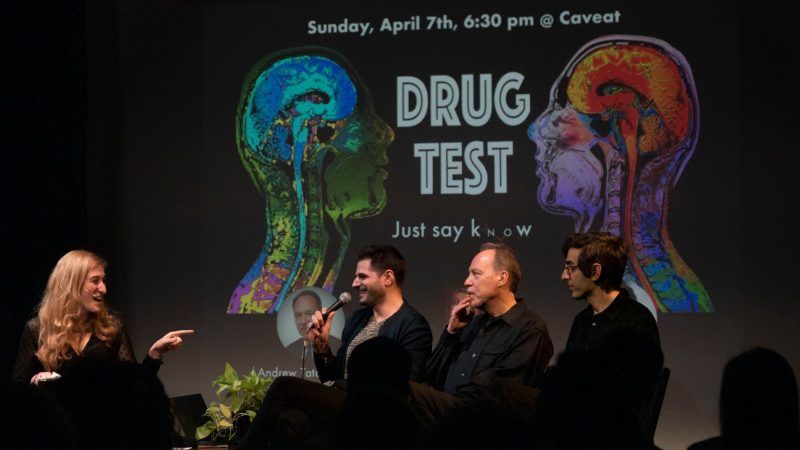What Will Post-Prohibition Drug Culture Look Like?
Sarah Rose Siskind's monthly show Drug Test is creating a world of educated psychonauts one trip at a time.

With the rise of legal recreational marijuana across the country and an unwinding of the drug war on the horizon, more and more people are thinking about how best to shape America's post-prohibition drug culture. What sorts of institutions, attitudes, and practices will help us figure out which chemicals we want to ingest to make ourselves happier, more productive, and more fulfilled? How do we best educate ourselves about the risks and rewards of better living through chemistry when everything from acid to Zoloft is legally in our home medicine cabinets?
Today's guest is working to stage that conversation. Sarah Rose Siskind, who was the head writer on the Reason TV series Mostly Weekly, hosts a monthly show called Drug Test at New York's Caveat theater. Each episode features a different drug—magic mushrooms, most recently—and scientists, researchers, and counselors discussing a particular substance's chemistry, history, and associated rituals. There's also footage of a "VIP" or "very intoxicated person" who performs a variety of mental and physical tests before and after ingesting the drug in question. The result is a frank, smart, and fun discussion of how we might all navigate the world after the drug war.
Audio production by Ian Keyser.
Links related to today's podcast:
Drug Test with Sarah Rose Siskind on Facebook
MAPS: Multidisciplinary Association for Psychedelic Studies
How to Change Your Mind: What the New Science of Psychedelics Teaches Us About Consciousness, Dying, Addiction, Depression, and Transcendence, by Michael Pollan
Trip: Psychedelics, Alienation, and Change, by Tao Lin
Hamilton's Pharmacopeia, on Viceland
Editor's Note: As of February 29, 2024, commenting privileges on reason.com posts are limited to Reason Plus subscribers. Past commenters are grandfathered in for a temporary period. Subscribe here to preserve your ability to comment. Your Reason Plus subscription also gives you an ad-free version of reason.com, along with full access to the digital edition and archives of Reason magazine. We request that comments be civil and on-topic. We do not moderate or assume any responsibility for comments, which are owned by the readers who post them. Comments do not represent the views of reason.com or Reason Foundation. We reserve the right to delete any comment and ban commenters for any reason at any time. Comments may only be edited within 5 minutes of posting. Report abuses.
Please to post comments


and an unwinding of the drug war on the horizon
What horizon you lookin' at? The one I'm looking at is restricting vaping to anyone under 21 with the ultimate goal of banning it altogether, and the prosecution of pharma companies for making a perfectly legal product.
The police-prison-prosecution complex has read the end of the drug war handwriting on the wall, and has already moved on to fighting the scourge human trafficking.
The number of homeless on the streets of France has increased as the country deals with a housing crisis
France must not be implementing the Koch / Reason immigration agenda if it's having this problem. A housing crisis would easily be fixed by an open borders policy that would let in more construction workers.
This'll come to fruition in the same way that the massive "Libertarian Moment" a few years back came to fruition.
Easy. We have this thing call the internet to do research. Most would *GASP* see some form of medical professional!
And "bad" drug use would be the same.
That branding & banality (listen at around minute 24) are on our minds reflects what an anachronism prohibition has become. While I'm glad to see punishment going out of style, I don't look forward to a team of marketers helping me decide which brand of LSD best defines me as a person.
Why not? Beer ads are funny. Whiskey ads are cool.
I've already seen pot heads complaining that MJ isn't cool any more, now that it's gone mainstream. Once the 50-somethings join in, it starts to lose its appeal to 20-somethings, sort of like what happened to Facebook.